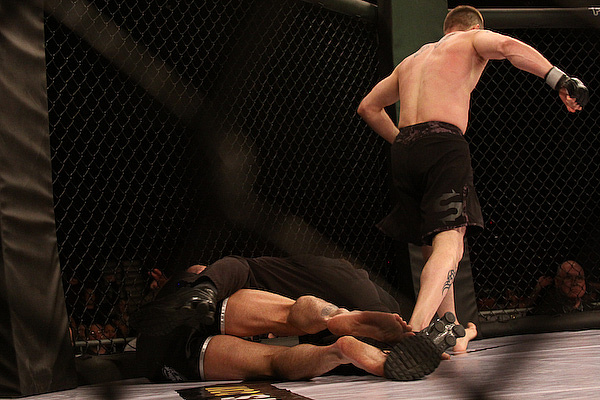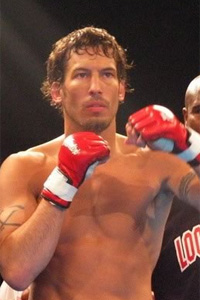Concussed: The Elephant in the Room
A Difficult Decision
Jason Probst Mar 12, 2011

An
unconscious fighter is attended to in a Columbus, Ohio,
professional MMA bout. | Sherdog.com
For Jeff Joslin, the decision to retire in 2007 after numerous concussions was not an easy one, until he remembered how it felt living with the grueling effects of them, for weeks, months, and, with the last one, a year and a half.
The decision is perhaps the toughest of all for fighters, who can play out the string inexorably, unlike their peers in the NFL and NHL, competing as long as a promoter will have them. With the inherent risks mixed martial artists meet in training, which include recurring impacts to the head through kickboxing and grappling, Joslin’s decision is one many fighters will undoubtedly face.
Advertisement
“He said if you didn’t have anything else to fall back on, you might have to go back in the cage,” Joslin recalls.
In Joslin’s case, his retirement led to a productive, happy life
after fighting. His story is not the crushingly tragic one faced by
numerous athletes who have sustained concussions and the
devastating fallout associated with head trauma. They range from
fatal tragedies -- Andre Waters, Chris Benoit, John Grimsley and
Dave Duerson -- to athletes battling with everyday mental
impairment. Joslin stands as a happy exemption.
Joslin’s schedule keeps him busy: training, selling his video instructions, doing color commentary for local shows and hosting a radio program on MMA. The decision to walk away from competition was right for him, he says, because the consequences of further injury were too grave to risk.
His story is a positive one, populated amongst the ranks of many athletes whose stories played out differently, often with different results. Given the emerging scientific data and public awareness on the subject, it seems likely that head trauma in sports will be the next hot-button issue to warrant change, both in practice conditions and competition.
Founded in 2008, the Boston University Center for the Study of Traumatic Encephalopathy (CSTE) is trying to do so. Chronic Traumatic Encephalopathy (CTE), a progressive degenerative disease caused by concussions and related head injuries, is the focus of its research. The center has been obtaining pledges from former and current NFL players to donate their brains for post-mortem analysis to collect data on them regarding CTE.
CSTE was co-founded by Dr. Robert Cantu and former Harvard University college football player Chris Nowinski, who also wrestled for World Wrestling Entertainment. Cantu, also a clinical professor of neurosurgery at Boston University, wrote the first guidelines on football players returning to action after concussions, and has been studying the effects of head trauma on the brain for more than 30 years.

Freddie
DeFreitas
Joslin retired from MMA in his prime.
“This young man made the right decision,” Cantu says of Joslin. “Probably the most widely held misconception until recently was that you had to be unconscious to have sustained a concussion. More than 90 percent of concussions do not involve loss of consciousness. Another misconception is that amnesia or loss of consciousness correlates to the severity of the concussions. What correlates best is how long the symptoms last.
“Number one, you need to take all unnecessary head trauma out of it and have far less head contact in practice,” he adds. “And for illegitimate purposeful uses of the head, make it illegal and call it. The rules are there, but they’re not enforced. As a professional, it’s there for the blindside hit but not enforced. I think by the fall [the NFL] will eliminate leaving the feet to hit with your head. It’s baby steps.”
For contact sports like MMA and boxing, changes can be enacted to reduce risks, as well.
“The big thing in boxing and MMA is to do a whole lot more work hitting bags and mitts, not hitting people in the face or head. There’s a huge amount of work that can be done that way,” Cantu says. “In terms of head trauma, in MMA, as brutal as some aspects of it are, it is less so than boxing. “
Cantu admits that since hard data on actual brains is still an emerging field -- something the center is literally doing on a case-by-case basis with donated brains from players -- it could be a long time before similar hard data emerges from boxing and MMA, especially the latter, since it is a relatively new sport. The need for study on the topic remains ever-pressing, especially with the numbers of players involved risking it, particularly in football.
“It’s a challenge to think that Pop Warner football is dropping their tackling age to 5, which is insane, so there are challenges that remain,” Cantu says. “We’ve got to change that tackle football to flag football. Let the kids run around and have fun and not get trauma to their heads. I’d probably take the collisions out until they’re 14.”
Duerson’s suicide on Feb. 17 was the latest tragic chapter. His successful career included Super Bowl rings with the Chicago Bears and New York Giants. According to the New York Times, Duerson, before shooting himself in the heart, sent a text message that read “Please, see that my brain is given to the NFL’s brain bank.” Duerson’s request will be granted. The process will study the brain for immuno stains from the protein, tau, which is the indicator of CTE, Cantu said.
According to an NFL study released in 2009, rates of Alzheimer’s or other memory-related impairments in former players are several times higher compared to overall rates. In players aged 50 and older, 6.1 percent say they had been diagnosed with a dementia-related condition, five times higher than the national rate. Players in the 30-49 demographic had a rate of 1.9 percent, 19 times that of the national rate.
The study has not been peer-reviewed but correlates with extensive research done on NFL players and head injuries. And while the sports are different, head impacts and concussions are injuries that have the same cumulative effects for MMA athletes. For participants in contact sports, concussions remain something of a boogeyman, a price of admission inevitably paid in varying degrees, with a grim shortage of hard science and medical treatment for the injury.
However, as an injury far less specific than most and with exceptionally high long-term health risks that far outweigh the impacts of a blown-out knee or other injuries, concussions can happen often with athletes not even knowing they have incurred one.
Enter Nowinski. A former college football player who wrestled for three years in the WWE, Nowinski suffered multiple concussions, including four during his stint as a professional wrestler. He believes awareness on head injuries, especially in contact sports, needs to be treated like any other impairment.
“We learn early on not to mess with neck injuries, and there are pitch [limits] in Little League,” Nowinski says, “but it has been shown that a concussion is different for everybody. Some people are more susceptible. You dramatically reduce the risk of long-term issues if you rest after concussions. Concussions cause a chemical cascade in the brain, causing it to not function very well for a period of time. “
“
More than 90 percent of
concussions do not involve
loss of consciousness.
”
From HBO’s “Real Sports” segment on tragically affected football players to the increasing awareness of how these injuries affect hockey players, concussions in sports remain a prevalent yet undiagnosed malady, and casualty list grows with each passing month.
Given the rigors of mixed martial arts training, MMA competitors have to deal with it, too.
Like their counterparts in hockey and football, the price of concussions will be something mixed martial artists have to pay, as well.
Continue Reading » Full-Time Hangover
Related Articles







